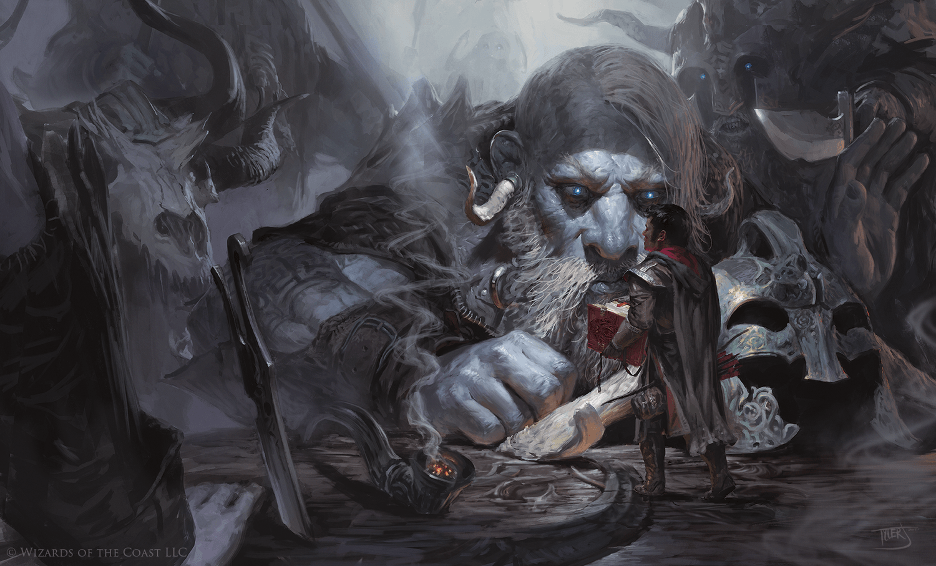By Faith Ojebuoboh, Pop Culture Classroom Instructor
Dungeons and Dragons isn’t just a game — it also helps develop educational and social skills!
Using probability to think about the chances by sneaking around a fire-breathing dragon? Cooperating to solve a riddle to open a door to a long-lost castle? Reading the handbook to pick the best spell to fight a mimic? You can do all of these things in a Dungeons & Dragons campaign!
Dungeons & Dragons (or D&D) is a cooperative tabletop game (Tabletop Roleplaying Game, TTRPG) where a storyteller (the Dungeon Master/DM) guides a communal story with other players who make characters that play and interact in the story world.

Dungeons and Dragons is fun… and can be educational. (Art: Tyler Jacobson, http://www.tylerjacobsonart.com/gallery-i)
So, why D&D? Why now?
In our current climate — a health crisis, schools being shut down, businesses and government buildings closed — we are all experiencing change. It might feel scary, lonely, or confusing. Being able to play confident, capable heroes, in turn, makes us feel more capable and confident. We also get to escape in a healthy way. We get to experience a different world. D&D gives us an opportunity to spend time with friends and family while social distancing.

D&D, Reading, and Writing
You have to be able to read and write in order to play.
Gameplay relies on handbooks, adventure paths, and self-published material — along with novels (Forgotten Realms, Dark Sun, Dragonlance series, and Ravenloft novels) that help enrich understanding of the fantastic worlds where many game sessions are set.
Players are encouraged to create and record complex backstories for their characters. And Dungeon Masters — people who guide the players through a story — learn organizational skills by keeping notes to move the story along, providing players with the right challenges and information to make the game enjoyable.
Playing a game makes reinforcing reading and writing skills fun and rewarding, and the desire for in-game success provides a reason to persevere if readers struggle with comprehension. It feels better to know that you read, used, and understood the perfect spell for an encounter.
Math Skills
Mathematics also plays a role in D&D (pun intended). Many skills, attributes, and qualities of the characters, monsters, and challenges have numbers that express difficulty, ability, or challenges. Basic addition, subtraction, and probability are used to predict and calculate the result of a given action.
The use of dice provides random chances at being successful or failing a task. Can the rogue run up the stair-rail and swing on the chandelier toward the enemy? How likely are they to succeed? This dictates the difficulty check (the probability of rolling the dice and using the skills in the way to equal or beat a given number that represents the likelihood of being successful).
Critical Thinking and D&D
Critical thinking and problem solving within the game are huge educational benefits.
In a recent campaign, our group of adventurers discovered missing people that had been kidnapped by ogres. A fellow player suggested sneaking in to kill the ogres. However, since they were playing a trickster-type character, they were able to walk in and con the ogres into believing that we were cave repair-men concerned about the Ogres’ safety. We successfully rescued the hostages while minimizing the danger at hand and the chances of damage to our characters.
This creative approach to problem solving can radically change our decisions and choices. Our problems can be solved by thinking differently, and D&D provides a safe outlet to do so.
Social Skills

D&D and other TTRPGs emphasize cooperation. Everyone takes on a role with weaknesses, strengths, and the need for others with complementary skills. Alone, a character can struggle. You have to work as a team to be successful.
Many players choose to play characters that are different from themselves to gain new perspectives. D&D gives us a chance to explore and express different parts of ourselves and others. Players can explore themes of race, gender, sexuality and being differently abled, or themes of confidence, power, attitude, and voice. Players can safely experiment with being creative, thinking differently, and communicating in different ways.
How do I play D&D while isolated?
Do you like maps, tokens, handouts, and online dice rollers? Check out Roll20 or Fantasy Grounds. These detailed programs work for many different games, include tutorials, and feature free and paid content tiers. Fantasy Grounds has integrated voice chat, while Roll20 has video and audio chat systems.


Do you want to play using theatre of the mind (no maps; imagination is the goal)? You can use Skype, FaceTime, Google Hangouts, or Zoom! Zoom lets you share your screen so others can see maps or handouts. For Zoom, you need a paid account in order to have unlimited time.
Looking for audio options and a dedicated server where you can post, play, and joke? Check out Discord. The sound is often crisp, and you can use Discord even when WiFi is poor.
Interested in even more ways to explore the game? Wizards of the Coast is giving out free material during this time! Check out the link here to start your own game!
Pop Culture Classroom
9am-5pm Monday-Friday


